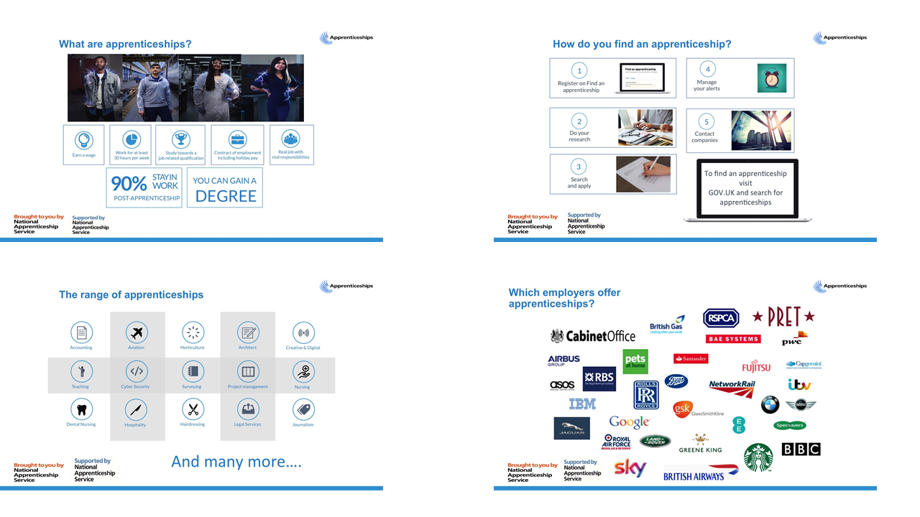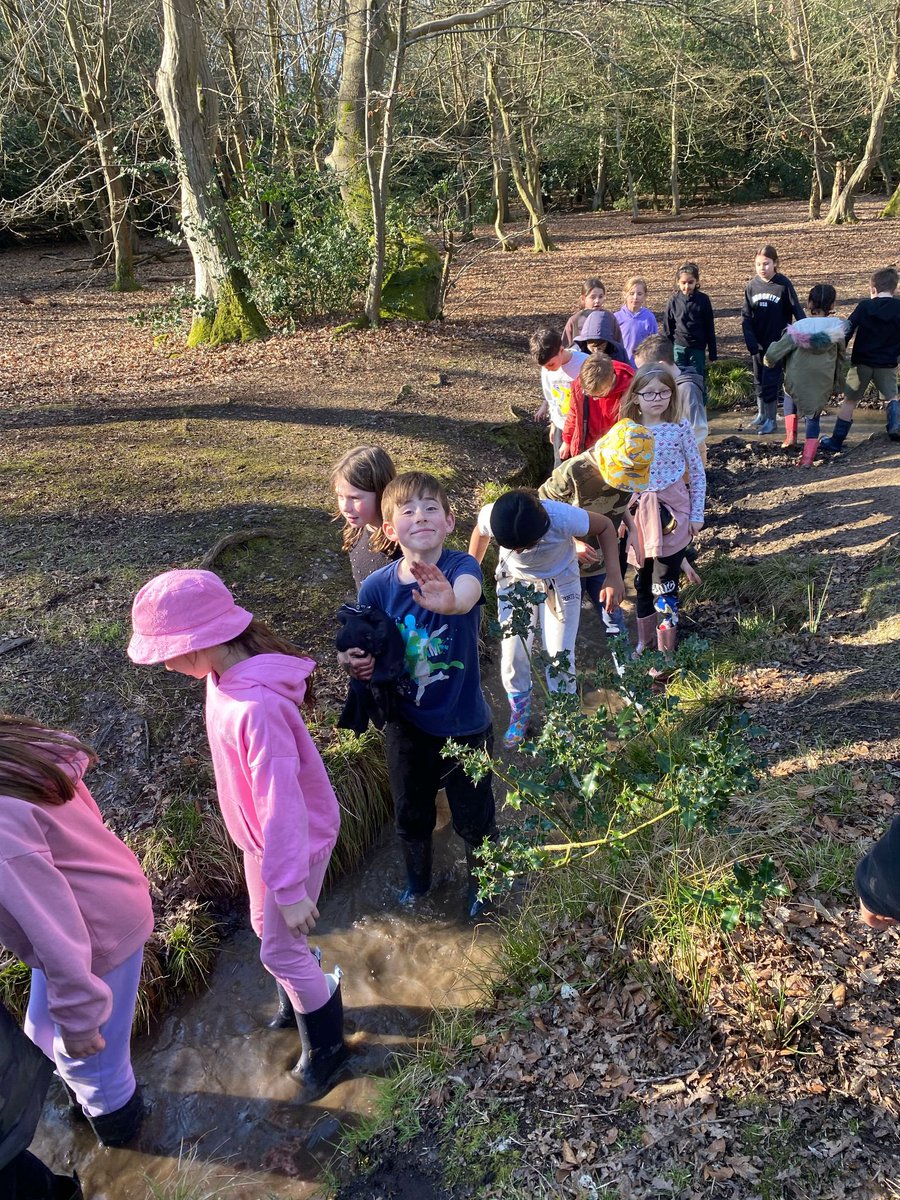Careers
At Samuel Ryder Academy, we want our students to enjoy success and happiness both at school and beyond; as such, our central vision is to enable our students to leave us confidently equipped for life. Whilst we hope (and expect) that our students will achieve ambitious academic goals, we also want them to acquire the relevant personal behaviours, values, and employability skills that will enable them to move forward with confidence into the next stage of their education, employment and future lives.
The Careers Lead and our Careers Adviser work closely to ensure that our students receive up-to-date, relevant and useful careers advice; as such, we have a specific Careers and Employability programme that provides informative, stimulating and age-appropriate advice to help our students to make informed and ambitious choices about their future.
Our specific careers and employability education programme has two central objectives: firstly, to help our students to understand themselves, their personal preferences/interests, and their strengths and attributes; secondly, to provide our students with tangible opportunities to explore wider external markets and to understand the huge range of career opportunities available to them.
In addition to the specialist programme, we are also aware of the importance of adopting a holistic approach: we recognise that every teacher has a role to play in helping our students to be ‘ready for work’ and every tutor is well-placed to monitor the personal development of their tutees. Through the PSHE programme and pastoral systems, for example, students receive career-based advice when choosing GCSEs, A-level and university courses. In addition, we are also lucky enough to be able to draw on the experience and expertise of our dedicated parent body and alumni who provide significant support for our many initiatives.
If you would like to find out more about careers and employability at Samuel Ryder Academy or if you are interested in providing support, please do contact Mrs E Rudd, Careers Lead, by completing the form at the bottom of this page.
Next review December 2025
Careers Education at SRA
How is Careers, Employability and Enterprise Education taught at Samuel Ryder Academy?
Samuel Ryder Academy is working towards implementing the eight Gatsby Benchmarks in line with the Government’s Careers strategy: making the most of everyone’s own talent (December 2017).
The Gatsby Benchmark Compass + Score for SRA
The Eight Gatsby Benchmarks of Good Career Guidance:
- A stable careers programme
- Learning from career and labour market information
- Addressing the needs of each pupil
- Linking curriculum learning to careers
- Encounters with employers and employees
- Experiences of workplaces
- Encounters with further and higher education
- Personal guidance
To enhance our provision, we also work with the Careers and Enterprise Company to ensure that we will fully meet the Gatsby Benchmarks.
Key Organisations Supporting SRA Careers Provision:
|
Hertfordshire Local Enterprise Partnership/Careers and Enterprise Company www.careersandenterprise.co.uk SRA Senior Enterprise Co-ordinator 2023-2024 is Caitlin Coogan |
|
|
Local Enterprise Industry Partners University of Hertfordshire and EV Cargo Logistics CEC LEP Advisors 2023-2024 are Ellie Jenkins - Akerlof and Daniel Doocey-Mayes - Civil Service |
|
Careers Programme 2023-2024
For Employers
Are you an employer looking to work with a school? Then we are looking for you!
We are keen to work with employers who can pass on the benefit of their skills, experience and expertise. Many of our careers events require volunteers who are willing to get involved in a variety of activities such as:
- Speak to students in small groups
- Present in assemblies
- Answer questions posed by students (speed networking in small groups)
- Interviewers (Microsoft Teams or face to face)
- Work with students to support our mock interview day and help edit their draft CVs
- Stall holders at a careers fair
- Link with curriculum areas to show students how their learning in specific subjects can lead in to various careers
Apprenticeships
What is an Apprenticeship?
An apprenticeship is a real job with training, that enables you to learn, whilst gaining a nationally recognised qualification. Apprenticeships take between one and five years to complete and are available in 1,500 occupations across 170 industries varying from construction to manufacturing through to IT and the creative and digital sectors.
There are various levels of apprenticeship you can apply for depending on your current skills and qualifications.
| Name | Level Equivalent | Educational Level |
|---|---|---|
| Intermediate | 2 | 5 GCSE passes 5 to 9 |
| Advanced | 3 | 2 A Level passes |
| Higher | 4,5,6 and 7 | Foundation degree and above |
| Degree | 6 and 7 | Bachelors or Masters Degree |
Benefits of Doing an Apprenticeship
- Earning a salary
- Training in the skills employers want
- Excellent progression opportunities, whether looking to study further or climb the ranks within the workplace
- Increased future earning potential
- Apprentices enjoy marked salary increases when they complete their training, and those completing a higher apprenticeship could see increased earnings of an estimated £150,000 over their lifetime
- Learning at a pace suited to the individual with the support of a mentor
Useful Apprenticeship Websites
The National Apprenticeship Service (NAS)
https://www.gov.uk/topic/further-education-skills/apprenticeships has lots of information about apprenticeships for young people, their parents and prospective employers. It also includes listings of current vacancies although you need to be registered in order to actually apply for any of these vacancies. In addition, it contains some excellent support materials for making a successful application
Parents’ and Carers’ Apprenticeship Information
https://amazingapprenticeships.com/app/uploads/2020/07/Parent-Pack-July-2020.pdf
In addition to having a university course search, Unifrog: https://www.unifrog.org also gives useful LMI about different sector areas and allows you to search for apprenticeship and school leaver programmes.
Not Going to Uni
http://www.notgoingtouni.co.uk is a useful website if you want to consider other options, rather than progressing onto university at the end of your A-level studies.
Get My First Job
https://www.getmyfirstjob.co.uk contains information about apprenticeships and traineeships as well as a job search function.
Student Ladder
If you are interested in working for a major national/international company like those listed below, go to the Student Ladder website: http://www.studentladder.co.uk and do some research on their school leaver programmes or work experience opportunities. There are ICT, financial, engineering, legal, human resource, accountancy opportunities, amongst others, available.
Here are some examples of the types of companies who offer school leaver programmes: British Airways, Bank of England, KPMG, Laing O’Rourke, Jaguar Land Rover, National Grid, Siemens, Mars, Aviva, Channel 4, IBM, Boots and Harrods.
Similar opportunities are also advertised on:
Rate my Apprenticeship: http://www.ratemyapprenticeship.co.uk/top-employers
All About Careers: http://www.allaboutcareers.com/jobs
Degree Level Apprenticeships
If you are interested in degree level apprenticeships, then you can use the UCAS Career Finder tool: https://careerfinder.ucas.com to search for opportunities.
University
The UCAS website: http://www.ucas.com contains key information on all UK university courses, with links to individual institutions websites – so that you can continue your research. It is also the website that students use to make their university applications at the start of Year 13.
Unistats: http://www.unistats.com is the website used for displaying the government’s Key Information Sets (KIS). It has up-to-date statistical information on each individual course at all the UK’s universities. There is information displayed on the following categories: student satisfaction, average salary after graduation, progression, accommodation costs, time spent in lectures & seminars, how it is assessed and student satisfaction with the university’s student union. You should also find a link to Unistats from individual university websites.
The school has recently purchased Unifrog: https://www.unifrog.org, which is a very useful website that brings together the information from a wide range of other resources that help students to search for suitable university degrees. Students can register and then use Unifrog to search for degrees taking into account location, quality of research, student satisfaction, contact hours, costs, assessment methods etc. It also has a section on apprenticeships/school leaver programmes. For log-in details, please see your form tutor.
UK Course Finder: http://www.ukcoursefinder.com is a website where you can search for universities based on course title, location and entry grades. If you are unsure of your plans but know that you want to progress onto Higher Education you can register (free of charge) and complete a short questionnaire that will ‘suggest’ degree courses that might interest you. This process is not an exact science but it can help you to start a search or to confirm your plans.
Uniguide: http://theuniguide.co.uk is another website that provides key information on individual degree courses, including the average UCAS points achieved by students actually starting the course, employment prospects and drop-out rates etc. For students unsure of their plans, they can also use the A level explorer tool: http://the uniguide.co.uk/a-level-explorer that suggests degree courses – based on the subjects that a student is studying or plans to study at A-level.

Apprenticeships Parents & Carers Guide
Please click here for our Apprenticeships Parents & Carers Guide
Careers Guidance and Advice
Information and One to One Guidance Appointments
Our Careers Adviser holds a Postgraduate Diploma in Careers Guidance (L6) and is a member of the Career Development Institute (CDI). Personal guidance interviews are provided to all students in year 11 and 13 and staff to develop their knowledge and understanding of local labour market information and opportunities.
In addition, opportunities are offered to students in Year 7-13 to have a personal careers guidance interview. Parents are able to speak with the Careers Adviser at transition evenings and can request to be present at their child’s careers guidance appointment.
Students can request advice either by asking their tutor, or by making a booking with our Careers Adviser. Most careers appointments last about 30 minutes and all students who have a meeting will receive an action plan summarising their plans and identifying their next steps
The National Careers Service
This is a free service for both young people and adults. Young people aged 13 and over can use the service to find information about jobs and courses, as well as requesting one to one support from a qualified adviser by ringing the helpline, emailing, texting or requesting a webchat. Call 0800 100 900 or log on to the National Careers Service
Support for learners who have left school
Learners who leave Samuel Ryder Academy after Year 11, 12 or 13 have continued support from YC Herts Careers Guidance Team. Professional careers advisers from the team are available to see learners from schools in St Albans. They can be contacted Tel: 01442 454060.
Support for learners with additional needs
Learners with additional needs will receive additional support from the YC Herts Careers Adviser who will be invited to annual reviews when learners requiring an Education Health Care plan (EHCP) reach Year 11. Students who have an EHCP or are in Local Authority Care will also receive additional careers guidance appointments through YC Herts.
Unifrog - helping students find their future
Unifrog: http://www.unifrog.org is an online platform that allows students to explore different career pathways: post-16, post-18 courses and institutions and apprenticeship options. Unifrog brings all the available information into one single, impartial, user-friendly platform that helps students to make the best choices and submit the strongest applications.
All students at Samuel Ryder Academy have a username and password for Unifrog.
Unifrog can help with the following:
- Explore what subjects you would be interested in studying and how these choices can lead to different career paths and higher education.
- Discover and sign up to online courses in areas that you are interested in.
- See what is needed to make a successful application to a College/Sixth Form.
- Explore how to successfully apply to an apprenticeship or university course, including universities abroad.
- Read blogs and insights to support you both while in school and the future.
Sixth Form
Samuel Ryder Academy Sixth Form offers a range of A-level subjects as well as other Level 3 qualifications. You can find out all about our Sixth Form offering here:
Samuel Ryder Academy Sixth Form
However, there are also other 6th Forms in the local area that students could consider applying to.
Colleges
There are a number of local Further Education Colleges that students can choose to progress onto. They offer a wide range of vocational subjects and some also offer A-levels or similar, more academic, qualifications.
Oaklands College: www.oaklands.ac.uk
West Herts College: www.westherts.ac.uk
T Levels
For further information on T Levels, please click here https://www.tlevels.gov.uk
T Levels are new courses coming in September 2020, which will follow GCSEs and will be equivalent to 3 A Levels. These 2-year courses have been developed in collaboration with employers and businesses so that the content meets the needs of industry and prepares students for work.
T Levels will offer students a mixture of classroom learning and ‘on-the-job’ experience during an industry placement of at least 315 hours (approximately 45 days). They will provide the knowledge and experience needed to open the door into skilled employment, further study or a higher apprenticeship.
The first 3 T Levels will be available at selected colleges, schools and other providers across England in September 2020. This means pupils who entered year 10 in September 2018 will be the first to be able to study them.
A further 7 T Levels will be available in September 2021.
These are the proposed pathways:
- Accountancy
- Agriculture, Land management and Production
- Animal Care and Management
- Building Services Management
- Building Services Engineering
- Catering
- Craft and Design
- Cultural Heritage and Visitor Attractions
- Design and Development
- Design, Surveying and Planning
- Digital Business Services
- Digital Production, Design and Development
- Digital Support and Services
- Education
- Financial
- Hair, Beauty and Aesthetics
- Health
- Healthcare science
- Human resources
- Legal
- Maintenance, Installation and Repair
- Management and Administration
- Manufacturing, processing and Control
- Media, Broadcast and Production
- Onsite Construction
- Science
Careers and Higher Education
Student Finance
Gov.uk
The main government website (http://www.direct.gov.uk) contains information on HE finance for English-based students and is the website where you will go to submit your application for financial support.
Scholarship Hub
The Scholarship Hub (http://www.thescholarshiphub.org.uk) is an excellent website that has information on financial support for students. You can go to this website and search by specific courses or just by a university; for some of the scholarships you will need to make applications – others will be organised by the university as soon as they receive confirmation that you will be starting with them, and once they know your individual financial circumstances.
Guardian
The Guardian (http://www.guardian.co.uk) has some good general information on student finance.
UCAS
The UCAS website (http://www.ucas.ac.uk) is also a good source of information on student finance.
Money Saving Expert
On this website (http://www.moneysavingexpert.com), Money Saving Expert, Martin Lewis, has some handy financial for prospective HE students, including a ‘6th formers guide’.
In addition, each individual university and college website will also contain relevant financial information, including about bursaries. Alternatively, give them a call – just make sure you don’t miss out on anything that you are entitled to.
For Teachers
Young adults who recall four or more encounters with employers while at school are five times less likely to be NEET and earn on average, 18% more than peers who recall no such activities". Dr Anthony Mann, Director of Research and Policy, Education and Employers Task Force.
Careers guidance needs to happen in the classroom, not just in distinct careers activities. We encourage all curriculum areas to embrace employer led learning, using industry professionals and resources to help deliver curriculum lessons, blending careers ideas with academic learning. There are numerous benefits for our students:
- TIME: Employer-led curriculum learning forms part of the planned timetable and doesn’t take pupils away from lessons.
- NEW IDEAS: Opportunity to discuss topics with external professionals who use subjects practically on a daily basis, exchanging ideas and expertise.
- NEW ANGLES: Use real life examples to get across concepts students find difficult to grasp.
- BUILD LONG-TERM RESOURCES: Develop the relationship into a regular experience.
- ENRICHMENT: Add an extra element to deepen curriculum learning.
- NEW INSPIRATION: You could be providing the single inspirational moment that changes the direction of a student’s life.
- MOTIVATION: Students see that subjects are relevant to the real world – and therefore why it’s important to study them.
Teachers are able to use their own acquaintances or ask Mr D Kiernan, Careers Lead: d.kiernan@samuelryderacademy.co.uk for support finding relevant contacts.






















